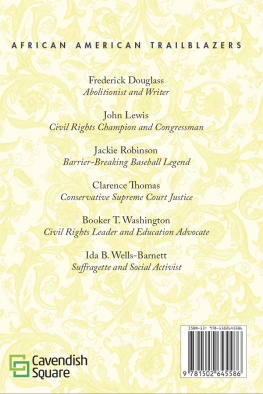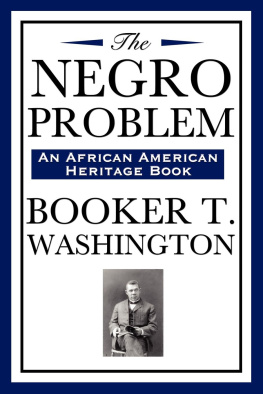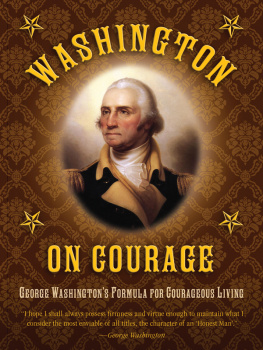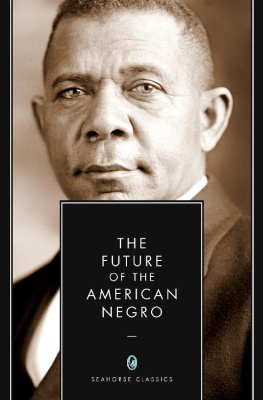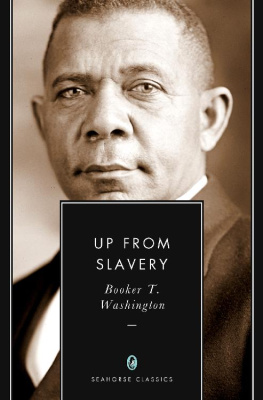Booker T. Washington
Rediscovered
Booker T. Washington
Rediscovered
Edited by Michael Scott Bieze and Marybeth Gasman

2012 The Johns Hopkins University Press
All rights reserved. Published 2012
Printed in the United States of America on acid-free paper
9 8 7 6 5 4 3 2 1
The Johns Hopkins University Press
2715 North Charles Street
Baltimore, Maryland 212184363
www.press.jhu.edu
Library of Congress Cataloging-in-Publication Data
Booker T. Washington rediscovered / edited by Michael Scott Bieze and Marybeth Gasman.
p. cm.
Includes bibliographical references and index.
ISBN-13: 978-1-4214-0470-7 (hdbk. : acid-free paper)
ISBN-13: 978-1-4214-0471-4 (pbk. : acid-free paper)
ISBN-13: 978-1-4214-0552-0 (electronic)
ISBN-10: 1-4214-0470-2 (hdbk. : acid-free paper)
ISBN-10: 1-4214-0471-0 (pbk. : acid-free paper)
ISBN-10: 1-4214-0552-0 (electronic)
1. Washington, Booker T., 18561915. 2. Washington, Booker T., 18561915Political and social views. 3. African American authors. 4. African AmericansBiography. 5. EducatorsUnited StatesBiography. I. Bieze, Michael, 1956 II. Gasman, Marybeth.
E185.97.W4B673 2012
370.92dc23 2011034756
[B]
A catalog record for this book is available from the British Library.
Special discounts are available for bulk purchases of this book. For more information, please contact Special Sales at 410-516-6936 or specialsales@press.jhu.edu.
The Johns Hopkins University Press uses environmentally friendly book materials, including recycled text paper that is composed of at least 30 percent post-consumer waste, whenever possible.
Contents
Preface
Historical accounts are only as good as the primary sources on which they are based. In the case of Booker T. Washington, the primary sources are very good indeed. Louis R. Harlan and Raymond W. Smock oversaw the selection and organization of materials known as the Booker T. Washington Papers. This selection of writings from the Library of Congress collection provides readers with an enormous number of letters and articles by Washington, a context for Washingtons letters (by reproducing many letters from other men and women), and a bibliography of many of his books and articles. Moreover, the Papers offer brief biographies of many of those whom Washington knew and with whom he exchanged letters over the years.
The Papers may be accessed online at the University of Illinois Press website. This site offers a helpful search option that makes even the location of words and phrases possible. Since their publication and online launch, the Papers have remained the starting point for nearly every historian conducting research on Washington. Harlan used them to create his Pulitzer Prizewinning biography of Washington. Robert Norrell analyzed selections from the Papers from a different perspective to write his recently published response to Harlan, Up from History. Like so many other projects, the Papers provided the starting point for this book.
We hope that readers will see our book as an important extension of the Papers in several ways. First, the Papers bibliography is incomplete. It does not contain all of Washingtons books; many of Washingtons contributions to other books and many journal articles are omitted, as are a great number of newspaper articles. Undoubtedly, new works by Washington will be discovered in the future. In other words, the Papers bibliography is essential but not definitive. For example, an 1897 letter in the Papers references a Washington article in the Boston journal Golden Rule (1897) but does not include it in the bibliography (fig. P.1). This article in Amos Wellss Christian journal points toward a body of Washington works destined to be discovered to expand our knowledge of him. Second, many of Washingtons letters and speeches were not stored at Tuskegee University and therefore did not enter the Library of Congress collection Harlan and his team organized when they created the Papers. Many of Washingtons letters, notes, and speeches remain in private hands and in institutions. We include a few examples of these so that, again, readers know that Washingtons writings extend far beyond the Papers. Third, the Papers do not reproduce Washingtons writings in their original form. A significant number of Washingtons works were created using photographs he selected and in layouts that he directed. As one of the first modern media masters, Washington crafted his thoughts in words and pictures. Without pictures and the original layout of the words, readers miss both the aura of the intent and original work. Booker T. Washington Rediscovered extends the known works, offers a thematic context for his writings, reproduces them in their original format as readers first encountered them, clarifies that he changed his mind on many subjects, and reminds the researcher that sources survive or gain importance for complex reasons.
This book would not have been possible without my dear friend Marybeth Gasman who has made so many things possible for me; the companionship and trust of Margaret Washington Clifford; Gerald Norwoods wisdom and friendship on this journey; the beautiful mind of Vida Avery; Phil Hutcheson, my mentor at Georgia State University; Lester Sullivan at Xavier University; Dana Chandler for all his generous help and guidance in the Tuskegee University Archives; Catherine Glass and Juanita Roberts in the Ford Motor Library at Tuskegee University; Mellie Kerins at the Augusta State University Reese Library; Vernon Courtney and Donzella Maupin at the Hampton University Museum and Archives; Jason Guzman; and the many insightful suggestions from Greg Nicholl, Andre Barnett, and Ashleigh McKown at the Johns Hopkins University Press. In addition, I am thankful for the research assistance of Meg Brooks, Carson Evans, and Marc Rosenkoetter; for my former students at Marist School; for the friendship and support of my Marist colleagues, Louisa Moffit, Gigi Muirhuid, and Stefanie and Sergio Stadler; and for most of all, my Laura, my Henry, and my Will, who are the center of my world.
Michael S. Bieze
I am grateful to Michael Bieze who has one of the most beautiful minds I have ever encountered. It has been a pleasure to work with him for years on this book. In addition to those individuals noted above by Michael, I am thankful for the support of my research assistants who read earlier drafts of this manuscript: Thai-Huy Nguyen, Christopher Tudico, and Stephen Garlington. And last, I am grateful to my very good friend and colleague, Nelson Bowman III, and, my sweet daughter, Chloe Sarah Epstein.
Marybeth Gasman
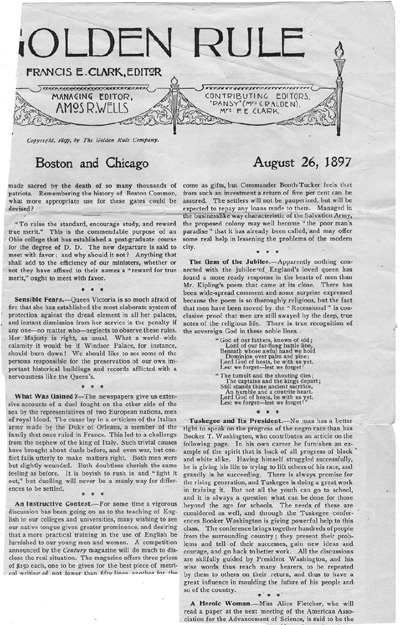

Note to Reader
The reader will soon discover that this book begins in a printed format but extends into a digital component at a website ( www.press.jhu.edu/BTW ). The reasons are both conceptual and practical. As a conceptual matter, this book is being published during a period of revolutionary change in how the written word is communicated. The Janus-headed format speaks to this moment in time by recognizing the importance of the physical object in conducting archival work and, at the same time, the reality of digital archives and the future of research in digital forms. The future will require researchers to still hunt through the physical holdings of archives.
Next page

